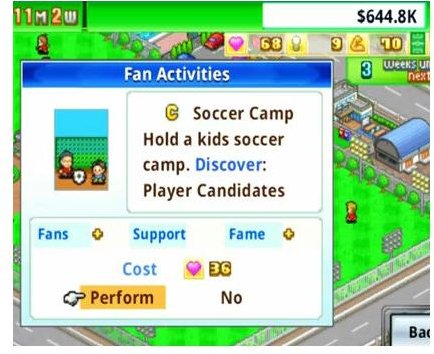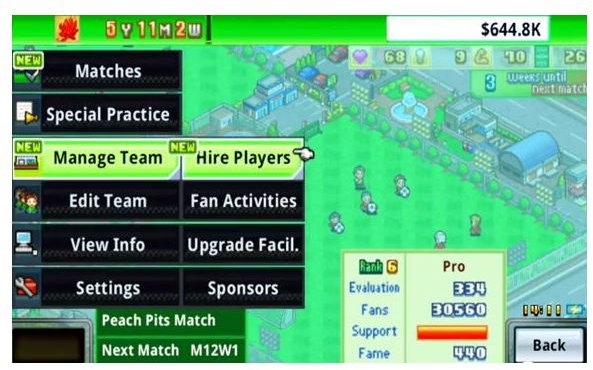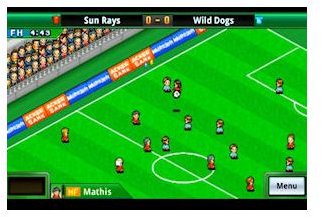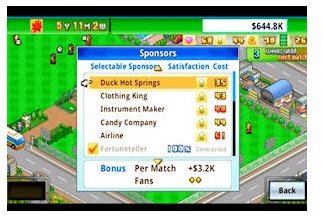Pocket League Story: A Review and Game Guide

Pitch Conditions (4 out of 5)
Whether you call it football or soccer, enthusiasts of this sport span the globe, and are known for putting the “fan” in “fanatic”. Just as in many other professional sports, soccer team management games are very popular among fans, but past ports from the PC to the mobile market have met with little success. Pocket League Story hopes to change that trend.
For those who have played previous Kairosoft games, the management system will be exceptionally familiar. As with all games in the series, the meat of the game lies in managing and growing your franchise. This time you’re charged with managing and developing a soccer team from small upstarts to, hopefully, champions. Despite the lack of any real innovation, they have somehow managed to keep the same old mechanics from seeming stale in this fun, if formulaic, offering.
Story-wise, this iteration puts you at the helm of a promising young soccer team. You’ll have eight seasons to make your ragtag team into champions. This is accomplished mainly by earning and then spending points. Unlike previous Kairosoft games, Pocket League doesn’t leave you waiting on your points and money to build up. In addition to starting you with a generous wad of start-up cash, which allows you to get the game rolling quickly, the mechanic of training and playing matches to earn points is the one refreshing tweak to the gameplay.
Game, Set, Match

Each match lasts about a minute and a half. Players don’t need to know more than what a goal is to succeed, but a little soccer knowledge is helpful when first starting out. The rules are simplified, to the point that there aren’t even red or yellow cards, so picking up the actual soccer aspect of the game shouldn’t take long. The rest of the game is fairly interchangeable with previous games in the Story series. The mechanics have simply been given a different façade, which may leave those who have played earlier games, like Game Dev Story, with a distinct case of déjà-vu.
You’ll use your newly gained points to pay for “research”. In this case, that translates to wooing sponsors for your club, improving the player’s skills, and improving the team’s stadium itself. These three aspects bring in money, allowing you to upgrade your players. As your players win more difficult matches, they’ll earn you new points, which will in turn be used to purchase more research, and so on. Pocket League Story involves managing a much larger “staff”, since you’ll be handling all your players. Each player has his own favorite positions to play, in addition to developmental potential and regular stats. You’ll have to build a balanced team that can dominate based on stat numbers alone. For instance, when your players finally take to the pitch, tackling (a move for taking possession of the ball) is a simple check of strength points between your player and the NPC player. The same is true for all actions between players.

The result is an experience that is occasionally weighed down as you make your way through menu after menu, but once your game is rolling along, this rarely becomes an issue. You’ll have to engage in lots of training sections, though, which unfortunately, gets in the way of an otherwise well-paced game.
Sights and Sounds (4 out of 5)

The graphics and menus are typical of all Kairosoft games and reflect a more refined version of classic Japanese RPG style of SNES sprites. The music is a simple 16-bit era style score, whose composition sounds like it was the soundtrack to a Mario Kart track left on the cutting room floor.
Pocket League Story is disarmingly charming in its presentation. The game doesn’t take itself seriously, and instead revels in its smart, but kid-friendly humor. Gags, such as your team piling into a vehicle that more resembles a clown car than a bus, are sprinkled throught the game. The stocky little character sprites, and simplistically cheery music, both serve to compliment and enhance the game’s whimsy.
Overall (4 out of 5)
It’s the same old story, but it’s worth telling just once more. This is not a game meant to simulate being a coach, but instead, the owner of the team. Those who are looking for a deep soccer management sim, like Championship Manager for the PC, will be sorely disappointed. You’ll spend most of your time planning resource use, although you can set your team’s play style, adjust formations, and pick substitution players. You will not have much control during gameplay, aside from releasing a player’s “aura”.
Those Android owners who love simulation games, or are simply interested in having a soccer management sim on the go, will not be disappointed. It remains to be seen how long Kairosoft can keep this formula fresh, but for now, it is still working. Soccer fan or not, If you’ve enjoyed their previous releases, or you are looking to give the series a try, you should give this game a shot.
Strengths
- The “Story” series gameplay is as addictive as ever.
- Resource gathering actively engages the player.
- Closely matched teams capture the highs and lows of watching a real game.
- Clean menu design makes for snappy management.
- Whimsical presentation.
Weaknesses
- Cluttered menu delivery system is not optimized to handle so many staff members.
- Training can be tedious.
- Soccer rules may be too simplified for hardcore fans of the sport.
- Strategy may seem too simplified for experienced “Story” series players.
- Retaining your player’s trained stats hurts replayability, as the game doesn’t scale the difficulty, and becomes exceptionally easy.
A Guide to Getting Your Head in the Game

Pocket League Story is less complex than most other games in the “Story” series. Once you grasp the fundamentals, you’ll rarely find your team losing matches, or have difficulty earning money and points. Just follow the tips below.
You’ll begin with a group of teammates who all have one thing in common – they’re incredibly average. They’ll simply never be superstars, as they lack the potential talent rating. Under each player you’ll see a label of either Average, Exceptional, World Class, or Superstar.
Your first goal is to begin replacing these money pits – no matter how much you train them they’ll never get any better. As soon as you see a new player available, check him out – only Exceptional players will be available at first. As you progress you’ll be able to move up the ranks to recruit players labelled “World Class” and eventually “Superstar”. Remember to spend your points wisely. For instance, don’t spend them training “Exceptional” players once you’ve unlocked access to “World Class” ones, as you’ll be replacing them soon anyway.
Next, you’ll need to choose three players to focus your special training on – most likely made up of a defender, goalie, and forward. Go into Special Training after each match and keep leveling their skills. Make sure you’re adding buildings to your soccer complex, and keeping extra players on your team who will make these buildings work, as those buildings generate special training points.
Research points belong to one of four classes – tactical, strength, heart, and idea. You’ll use these for training players, recruiting sponsors, and fan events. Make sure you’re funding those fan events, as they’ll give you access to new features, including new training activities, buildings, coaches, players, and more. Remember to unlock activities evenly across the board as well, or you will find you’re playing catch-up later down the road after you’ve created a team heavily unbalanced into one skill. Finally, don’t underestimate the benefit of sponsors. Not only do they generate cash, but they also unlock special talent stats.
References
- Tested’s App of the Day: Pocket League Story, http://www.youtube.com/watch?feature=player_embedded&v=ye85d3bnjIM#!
- Kairosoft’s official website, http://kairopark.jp/iphone/en/
- Screenshots taken by author on Samsung Nexus 4G Android Phone
